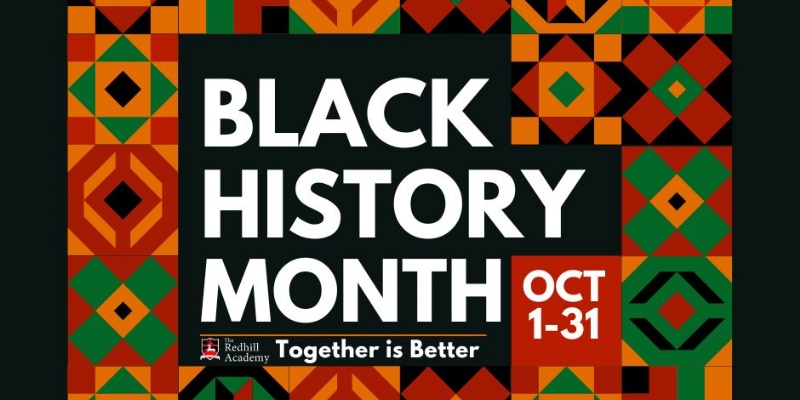
BLACK HISTORY MONTH
Black History Month Lecture: Intergenerational Role Models
Qaa'Sim Uhuru is a former Redhill student now in his third year at Manchester University. This event is open to all students and will be followed by seminar workshops.
Where: The Redhill Academy, Main Hall
When: Monday 31st of October from 3:15 pm
To get to a better tomorrow, we can’t just focus on the past. The past is in the past. We can acknowledge and learn from it, but to improve the future, we need action, not words. We need to come together around a shared common goal to achieve a better world for everyone.
This year’s Black History Month in October is more important than ever. It’s not just a month to celebrate the continued achievements and contributions of Black people to the UK and around the world. It’s also a time for continued action to tackle racism, reclaim Black history, and ensure Black history is represented and celebrated all year round.
Black History Month UK
Why is Black History Month necessary?
People from African and Caribbean backgrounds have been a fundamental part of British history for centuries. However, campaigners believe their value and contribution to society is often overlooked, ignored or distorted.
Most schools still teach a history curriculum which focuses on traditional events and the achievements of white figures. Black History Month gives everyone the opportunity to share, celebrate and understand the impact of black heritage and culture.
Where did Black History Month originate?
Known as the "Father of Black History", Carter G Woodson was born in Virginia in 1875 and was the son of former slaves. Growing up, access to a good education and job opportunities were limited, but he ended up studying at one of the few high schools for black students after saving money from working as a coal miner.
Over the years he gained an impressive number of qualifications, including a PhD in history from Harvard University. In 1926 he sent out a press release to mark the first Black History Week in the US. Throughout his life, Carter G Woodson worked tirelessly to promote black history in schools, leaving an indelible legacy.
The event was expanded in 1970, and since 1976 every US president has officially designated February as Black History Month in the US.
February was chosen in the US because it coincides with the births of former President Abraham Lincoln and Frederick Douglass - who escaped slavery and became a key social activist. Both men played a significant role in helping to end slavery.
How is Black History Month celebrated?
The event is intended to recognise the contribution and achievements of those with African or Caribbean heritage. It's also an opportunity for people to learn more about the effects of racism and how to challenge negative stereotypes.
When Black History Month first started in the UK, there was a big focus on black American history. Over time there has been more attention on black British history and key black figures from the UK, such as:
- Walter Tull, the first black officer to command white troops in the British Army and one of English football's first black players
- Malorie Blackman, a bestselling author and the first black Children's Laureate
- Olive Morris, a social activist who co-founded groups such as the Organisation of Women of African and Asian Descent and the Brixton Black Women's Group
- Dr Shirley Thompson, the first woman in Europe to conduct and compose a symphony within the last 40 years
- Lewis Hamilton, one of the most high-profile competitors in Formula One and the only black driver
Black History Month is also celebrated in the community in places such as museums, care homes and workplaces. A broad range of topics is covered, from Britain's colonial past to migration and music.
The Department for Education says black history is an important topic and schools have the freedom to teach it within the history curriculum, and can do so from primary school age onwards.

